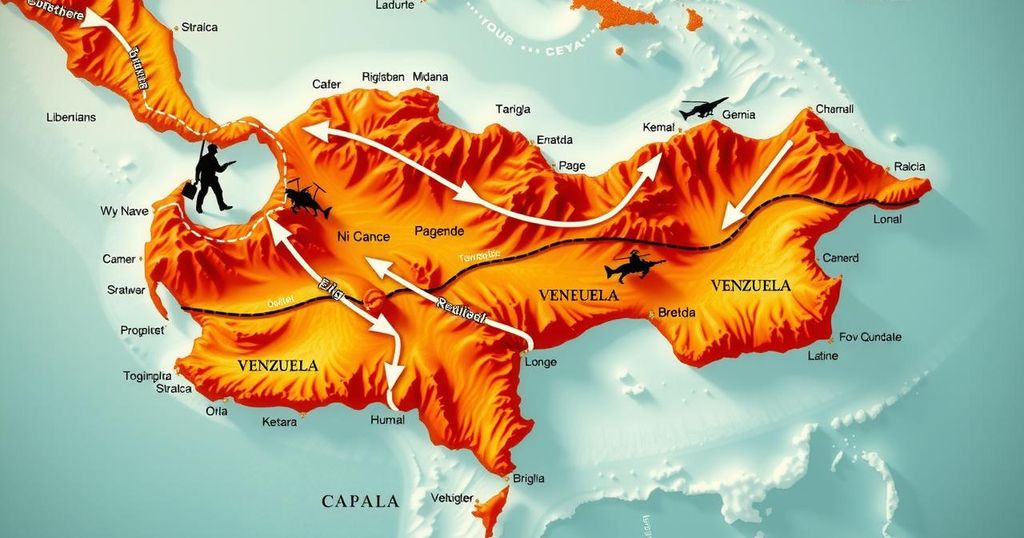President Trump’s recent decision to revoke licenses for companies like Chevron selling Venezuelan oil suggests a return to a maximum pressure strategy. This approach contrasts with Richard Grenell’s engagement strategies, which resulted in prisoner exchanges and cooperation with Venezuelan authorities. A focus on targeted engagement rather than punitive sanctions may be the key to fostering democratic change and improving conditions in Venezuela. Advocates should also adjust immigration policies to better reflect humanitarian needs for Venezuelans affected by the crises.
Recently, President Donald Trump declared his intention to annul licenses previously granted to companies like Chevron, enabling them to sell Venezuelan oil. The Treasury Department’s Office of Foreign Asset Control (OFAC) subsequently mandated Chevron to cease operations in Venezuela within a month. This shift signals a return to the maximum pressure strategy, reminiscent of approaches taken during Trump’s initial term and largely influenced by congressional pressure from Florida representatives who advocate for a stringent approach towards Venezuela.
The recent policy reversal stands in stark contrast to former envoy Richard Grenell’s strategy, which favored engagement over pressure. Grenell met with Nicolás Maduro, resulting in U.S. prisoner releases and agreements on managing Venezuelan migrant deportations. He emphasized Trump’s commitment to avoiding regime change, a significant departure from earlier U.S. tactics that aimed to oust Maduro.
During Trump’s first administration, the policy hinged on the belief that sanctions would hasten the downfall of the Maduro regime. Prominent figures like Bolton reinforced the notion that oil sanctions would weaken Maduro’s hold on power. However, the strategy yielded disastrous results, culminating in Venezuela’s dire economic conditions and a mass migration crisis, while Maduro continued to consolidate authoritarian control.
Despite the hard-line rhetoric, engaging with Venezuelan authorities has potential benefits, as demonstrated by Grenell’s and González’s recent interactions. Both officials recognized the need to address shared interests while promoting gradual reforms within Venezuela. For Trump to succeed, an approach emphasizing targeted engagement over maximum pressure may provide a more viable avenue towards lasting change.
Advocates of aggressive measures against Maduro often overlook the complexities of Venezuela’s political landscape. The narrative surrounding the economic crisis being solely due to Maduro’s incompetence simplifies a broader context, where U.S. sanctions have significantly contributed to the nation’s struggle. Moreover, the historical support for Chavismo reflected its role in addressing social inequalities, with waning support emerging during the current economic downturn.
The recent election dynamics further illustrate Venezuela’s political turmoil, with credible opposition claims of electoral fraud perpetuating Maduro’s presidency amid repression of dissent. The U.S. has promised a substantial reward for Maduro’s capture, heightening tensions and fostering fears of political retaliation against opposition leaders.
Establishing a sustainable democratic framework necessitates more than coercive tactics; it requires a political settlement fostering cooperation among rival factions. The path forward could involve negotiating a power-sharing agreement, facilitating gradual electoral participation, reminiscent of successful transitions in other countries.
A constructive U.S. engagement framework could steer Venezuela away from past negotiation failures. Future discussions should prioritize institutional reforms ensuring fair electoral mechanics, rather than contesting control of the presidency.
The contrasting views emerging within the Trump administration highlight a critical juncture where engagement could promote economic recovery and democratic development in Venezuela. Embracing this approach proves significantly more effective than previous tactics predicated on aggressive sanctions or interventionist strategies.
Moreover, the newly proposed Venezuelan Adjustment Act reflects the U.S. commitment to aiding individuals escaping oppressive regimes, presenting a bipartisan attempt to address humanitarian needs while fostering a responsible immigration policy. This includes reevaluating recent decisions affecting Venezuelan Temporary Protected Status to uphold commitments made to Venezuelan individuals fleeing crises.
The administration’s internal divergence on handling Venezuela is evident, with some advocating for renewed sanctions while others, influenced by Grenell, recognize the benefits of a more conciliatory approach. Ultimately, an emphasis on engagement offers a sustainable pathway toward revitalizing Venezuela’s democracy, departing from discredited methods that have failed to produce the desired outcomes.
In summary, President Trump’s recent policy direction towards Venezuela marks a potential return to a problematic maximum pressure strategy that lacks efficacy. The contrasting engagement-focused tactics of former envoy Richard Grenell highlight a more promising approach, advocating for collaboration aimed at improving conditions within Venezuela. To foster genuine democratic transitions, Trump must prioritize targeted engagement and reforms over isolation and coercion, as historical evidence suggests that punitive measures have only entrenched authoritarianism. Compassionate and responsible policies regarding Venezuelan migrants are also essential in demonstrating the U.S. commitment to support those escaping the ongoing crisis.
Original Source: foreignpolicy.com




